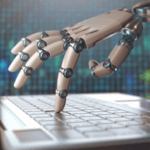AI and hospitality complement each other in many ways. Artificial intelligence, or AI, is playing a growing role in hotels around the world. While some have embraced this new technology, some are skeptical.
Does my hotel really need such advanced technology? Would using AI eliminate the human touch that gives many hotels their charm? These concerns are valid. However, if used tastefully, AI can enhance the visitor experience. It doesn’t have to totally replace a personal touch. Here’s why you should consider using AI at your hotel.
What Is AI?
Before we look at some benefits of using AI in the hospitality industry, let’s define it. People explain artificial intelligence in different ways. Merriam-Webster provides this definition:
“A branch of computer science dealing with the simulation of intelligent behavior in computers” or “the capability of a machine to imitate intelligent human behavior.”
Basically, it involves computer systems that perform tasks that require what we would refer to as “intelligence,” or some form of thinking. It might involve making decisions or translating between languages, as well as simulating human senses by perceiving visuals or sound.
24/7 Service
Artificial intelligence can help with various guest services functions. They can help guests book rooms or answer basic questions. Room service is another area in which AI can be beneficial. And it can offer fast service and provide detailed information 24/7.
You can use AI-powered chatbots to answer guest questions. You can host bots on a messaging platform, such as Facebook Messenger, or on your website. You would then program this bot with the answers to common questions. People could interact with it by sending messages back and forth like they would with a person.
Some hotels have started using physical robots that can talk to guests. Hilton and IBM teamed up to create Connie, a two-foot-tall bot guests can speak to at check-in. Connie provides information about local attractions and learns as it answers questions. This allows it to improve over time.
A human staff could, potentially, do this same thing. However, you have to ensure personnel is always on the clock, which gets expensive. Service also slows when human workers get a high number of requests. An AI chatbot can accommodate an unlimited number of guests. People also have limited knowledge, while a bot could potentially access all the information that’s online. Additionally, robots don’t get tired, frustrated, or forgetful.
While technology won’t be able to completely replace human staff anytime soon, it can help perform some of the guest service functions.
More Personalization
Hotels can collect information about guests through their online activity. Or they can survey other sources about guests’ accommodation and food preferences, hobbies and interests, travel habits and more. By combining all this data into one system and analyzing it with AI, you can provide travelers with a unique, personalized experience. The more frequently someone visits your establishment, the better your knowledge you will have of them.
You can use this information to offer them special deals or suggest local attractions they might like. You can highlight room-service dining options that fit their tastes.
This way, rather than provide the same generic experience to all your guests, you can offer each a unique one that’s tailored to their interests. The personalized hotel stay will lead to improved customer satisfaction and the notion your company cares about and understands your guests’ needs.
AI can even help adjust a customer’s room to their preferences. A smart thermostat enables customers to adjust the temperature of their room. They may pre-program it so it warms or cools their room just before they come back to the hotel. Smart devices also control the drapes, lighting, TV and other features of a room. These devices could even be voice-enabled so customers don’t have to get out of bed to turn off the lights or adjust the AC.
Improved Business Insights
Data can also be helpful on the business side. By analyzing patterns of customer information, hoteliers gain broad insights into their customers’ likes and dislikes. This helps better assess the performance of business initiatives.
For example, a hotel might use data to predict lulls in bookings and offer special rates to counteract them. They could also gather data on the food that guests order so that they know what to keep on the menu and what to pull off. They could use AI to predict what menu items might be popular based on previous visitor favorites.
Additionally, installing smart devices could save money. For instance, smart thermostats and smart lighting that only turn on when they’re needed will reduce energy costs. Plus, it will make the hotel more environmentally friendly, an aspect to market to guests.
Knowing more about your customers also leads to more effective marketing. You can use this data to better predict who would be interested in booking your rooms, and then target your advertising to them.
Customers today increasingly expect a personalized experience and fast, on-demand service. While you don’t want to totally eliminate the human aspect of your hotel, you can still get the benefits of AI with small changes. By using technology to create a more intelligent hotel, you give customers an improved experience and boost business at the same time.
Author Bio: Nathan Sykes is a technology blogger and the editor of Finding an Outlet.





